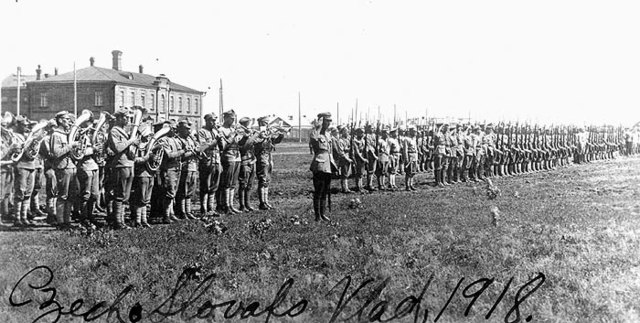The aftermath of World War I saw far-reaching and wide-ranging cultural, economic, and social change across Europe, Asia, Africa, and even in areas outside those that were directly involved. Four empires collapsed due to the war, old countries were abolished, new ones were formed, boundaries were redrawn, international organizations were established, and many new and old ideologies took a firm hold in people's minds. World War I also had the effect of bringing political transformation to most of the principal parties involved in the conflict, transforming them into electoral democracies by bringing near-universal suffrage for the first time in history, as in Germany, Great Britain, and Turkey.
William Orpen's The Signing of Peace in the Hall of Mirrors: the signing of the Treaty of Versailles in the Hall of Mirrors at the Palace of Versailles in 1919
Demonstration against the Treaty in front of the Reichstag building
Subject nationalities of the German alliance
Czechoslovak Legion, Vladivostok, 1918
Following their defeat in World War I, the Central Powers agreed to pay war reparations to the Allied Powers. Each defeated power was required to make payments in either cash or kind. Because of the financial situation in Austria, Hungary, and Turkey after the war, few to no reparations were paid and the requirements for reparations were cancelled. Bulgaria, having paid only a fraction of what was required, saw its reparation figure reduced and then cancelled. Historians have recognized the German requirement to pay reparations as the "chief battleground of the post-war era" and "the focus of the power struggle between France and Germany over whether the Versailles Treaty was to be enforced or revised."
Avocourt, 1918, one of the many destroyed French villages where reconstruction would be funded by reparations
Demonstration against the Treaty of Versailles, in front of the Reichstag.
Trains loaded with machinery deliver their cargo in 1920 as reparation payment in kind.
Protests by gymnasts from the Ruhr at the 1923 Munich Gymnastics Festival. The sign on the left reads "The Ruhr remains German". The right placard reads "We never want to be vassals".







